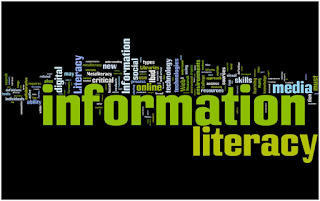I Am an African American Male Librarian or I’m Not Really Consumed in the (Servile Obedience to) Others: Part II
I am an African American man.
I am a librarian.
Those attributes tend to put me in the margins of librarianship. I do not mind. I can do a lot of good in the margins.
An adjunct reference and instructional services librarian at a suburban Michigan university, I work the reference desk Monday and Tuesday evenings from 5:00-9:00pm and every other weekend. I work the late shift.
In higher education, adjunct faculty is often considered marginal. But within that marginal position, I perform a "radical" type of reference service that focuses on the social and political aspects of information and knowledge. Of course, I get the "where is the bathroom" type of questions. But for the other inquiries, I try to help patrons develop a new type of relationship with information and knowledge, one that hopefully goes beyond keyword searching and looking for known items.
I consider the reference desk as a space for meaningful dialogue between patrons and librarians. I do not present myself as an authority who can instantly find stuff for patrons (Google can help them find stuff very quickly). Rather, I present myself as a collaborator. I dialogue with patrons. I listen to their requests and ask questions to clarify their requests. This may sound like a traditional reference interview. But I ask questions that encourage students to connect ideas within sources. For instance, I had a patron who wanted information about public transportation in Detroit and Chicago. She had to compare the two systems.
Instead of just telling her where to find the information, I asked her questions about the social, political, and economic differences between Chicago and Detroit. To meaningfully compare the two transportation systems, the student may want to understand the social, political, and economic forces that shaped each system. She talked about Detroit and how the automotive industry influenced the city's public transportation. Because I lived in Chicago for 11 years, I mentioned my knowledge of the city's history and its development of public transportation. In other words, I didn't do most of the talking. We dialogued. She demonstrated the importance her lived experience and observations. I listened and contributed my observations.
I believe I helped the student realize her own observations are just as valid as mine or any authority she may encounter during her database searches. I hope the interaction helped the student to converse with these authorities as effectively and easily as she conversed with me.
I must confess that my "radical" method of reference services is not entirely my own invention. I am heavily influenced by Paulo Freire. In the field of education, Freire is known for his very liberal approaches to pedagogy. Freire (1970/2005), for instance, encourages meaningful dialogue between students and teachers, instead of a "banking" pedagogy in which teachers deposits knowledge inside their student heads, to be withdrawn later for tests and other occasions ( pp.71-72).
Informed by Freire's pedagogy, I believe that a reference interview can be "an act of creation...[and not] a crafty instrument for the domination of one person by another" (Freire, p.89). Although I am a highly educated, well trained librarian, I try not to dominate reference interviews. At the same time, as I mentioned in the previous post, I am not servile and self-effacing. I am a collaborator. I try to help patrons find their own voices and shape their own knowledge.
In other words:
I am an African American Male librarian. A marginal figure.
But then again, a lot of good can be done in the margins.
REFERENCE

I am enjoying your blog, Johnnie, and this post in particular resonated deeply with me. As soon as I finish my coursework this semester, I intend to familiarise myself with Freire's work. Thank you.
ReplyDelete